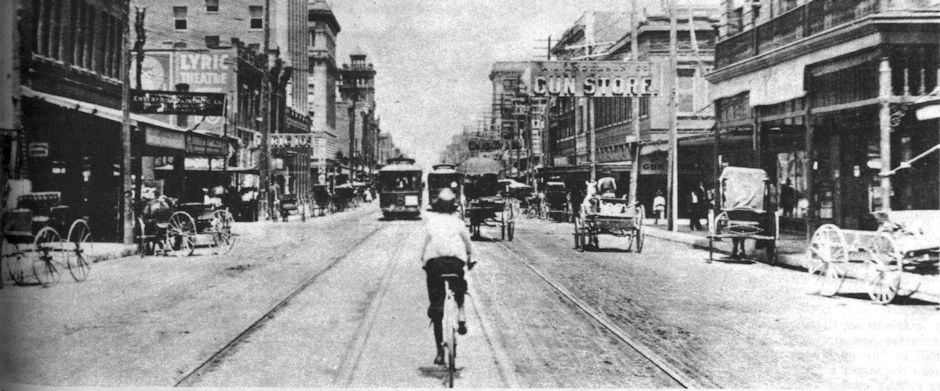Ads for patent medicines in the Fort Worth newspapers of a century-plus ago show us that if you weren’t feeling poorly back then, you just weren’t trying.
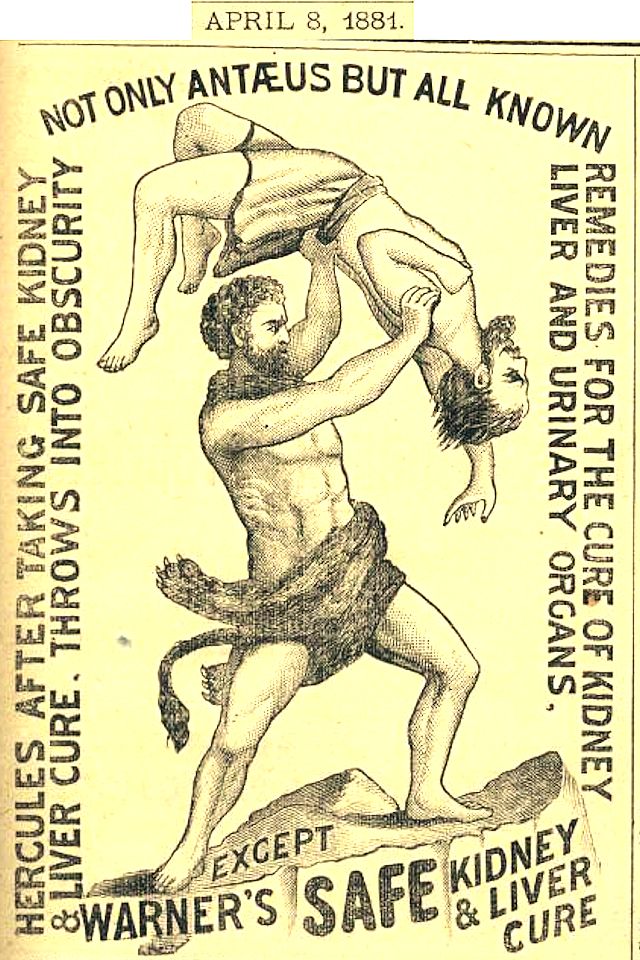 From 1881. This ad appeared on the front page of the Daily Democrat. In those days folks got a dose of Greek mythology with their medicine: After taking a swig of Warner’s Safe Kidney & Liver Cure, Hercules was able to defeat the giant Antaeus, who had challenged Hercules to a wrestling match. Warner’s Safe Kidney & Liver Cure probably got a lot of Greek heroes into wrestling matches: The stuff was 90 percent alcohol. Warner marketed a similar product, Warner’s Safe Cure, to women.
From 1881. This ad appeared on the front page of the Daily Democrat. In those days folks got a dose of Greek mythology with their medicine: After taking a swig of Warner’s Safe Kidney & Liver Cure, Hercules was able to defeat the giant Antaeus, who had challenged Hercules to a wrestling match. Warner’s Safe Kidney & Liver Cure probably got a lot of Greek heroes into wrestling matches: The stuff was 90 percent alcohol. Warner marketed a similar product, Warner’s Safe Cure, to women.
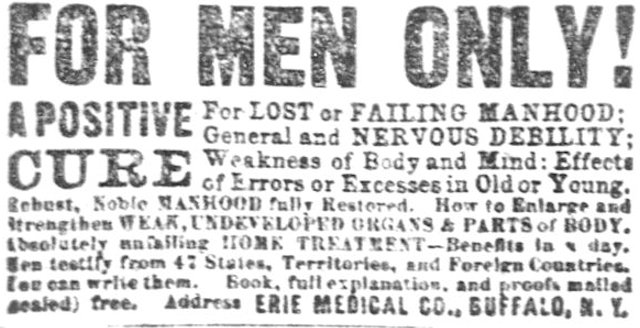 From 1895. A favorite ploy of patent-medicine advertisers was to prey on men because of their insecurities. Do you suffer from “weakness of mind and body”? That phrase is just general enough that many a man might read it and find himself nodding in recognition. Erie Medical Company of Buffalo, New York, offered “for men only” an unnamed “home treatment” that was “a positive cure” for “effects of errors or excesses in old or young.”
From 1895. A favorite ploy of patent-medicine advertisers was to prey on men because of their insecurities. Do you suffer from “weakness of mind and body”? That phrase is just general enough that many a man might read it and find himself nodding in recognition. Erie Medical Company of Buffalo, New York, offered “for men only” an unnamed “home treatment” that was “a positive cure” for “effects of errors or excesses in old or young.”
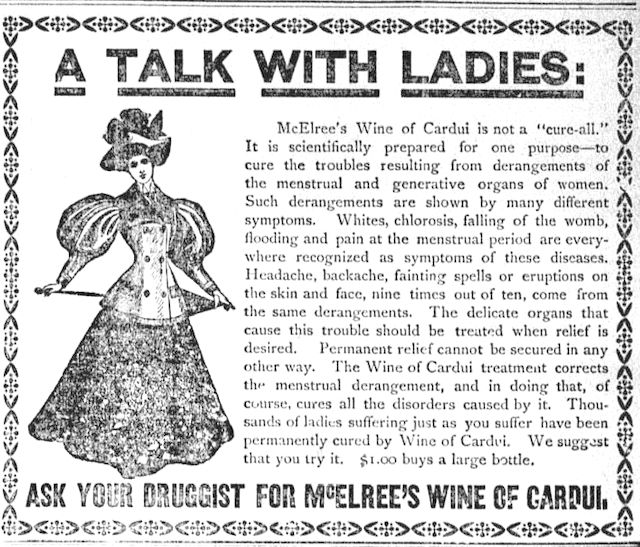 From 1896. Another favorite ploy was to prey on women because of “derangements” of their “menstrual and generative organs.” Wine of Cardui cured “the troubles resulting from derangements” of those organs. This ad was loaded with scattershot: It reminded women readers that “such derangements are shown by many different symptoms.” Got a headache? That’s a sure sign of derangements. Have some Wine of Cardui. Got a backache? Another sure sign of derangements. Have some more Wine of Cardui. Got fainting spells? A sure sign of derangements. Take another swig. Got a ticket for being drunk on your bustle? Well, no wonder, woman: Wine of Cardui was 20 percent alcohol.
From 1896. Another favorite ploy was to prey on women because of “derangements” of their “menstrual and generative organs.” Wine of Cardui cured “the troubles resulting from derangements” of those organs. This ad was loaded with scattershot: It reminded women readers that “such derangements are shown by many different symptoms.” Got a headache? That’s a sure sign of derangements. Have some Wine of Cardui. Got a backache? Another sure sign of derangements. Have some more Wine of Cardui. Got fainting spells? A sure sign of derangements. Take another swig. Got a ticket for being drunk on your bustle? Well, no wonder, woman: Wine of Cardui was 20 percent alcohol.
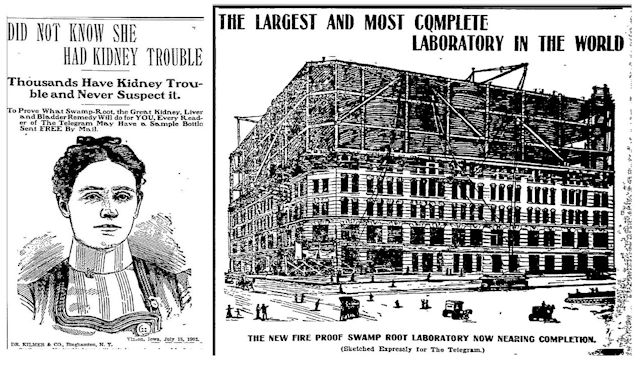 From 1902. This ad for Swamp-Root is an example of the opposite ploy of patent-medicine advertisers: Instead of warning readers that an illness has many symptoms, warn readers that an illness has no symptoms. “Did not know she had kidney trouble. Thousands have kidney trouble and never suspect it,” this ad says. Thus, if your kidneys feel fine, that’s a sure sign you have kidney trouble and need a bottle of Swamp-Root. Alcohol: 8 percent.
From 1902. This ad for Swamp-Root is an example of the opposite ploy of patent-medicine advertisers: Instead of warning readers that an illness has many symptoms, warn readers that an illness has no symptoms. “Did not know she had kidney trouble. Thousands have kidney trouble and never suspect it,” this ad says. Thus, if your kidneys feel fine, that’s a sure sign you have kidney trouble and need a bottle of Swamp-Root. Alcohol: 8 percent.
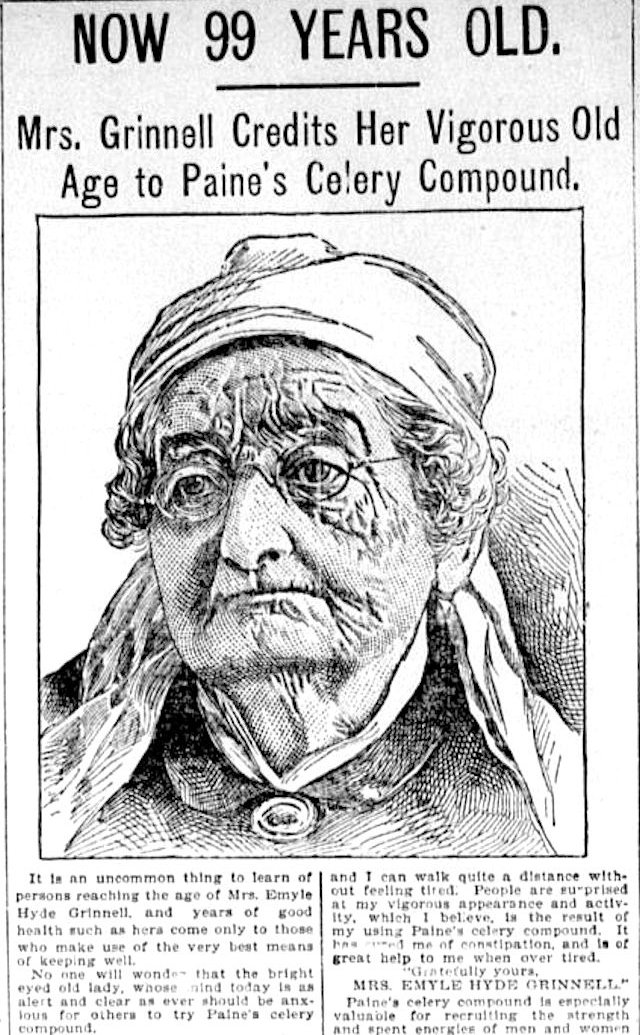 From 1903. Paine’s Celery Compound was ten grains (.02 ounce) of celery seed and 19.8 percent alcohol. “People are surprised at my vigorous appearance and activity, which I believe is the result of my using Paine’s celery compound,” said Mrs. Emyle Hyde Grinnell. I think you will agree that Mrs. Grinnell’s expression virtually shouts, “Party at my place!”
From 1903. Paine’s Celery Compound was ten grains (.02 ounce) of celery seed and 19.8 percent alcohol. “People are surprised at my vigorous appearance and activity, which I believe is the result of my using Paine’s celery compound,” said Mrs. Emyle Hyde Grinnell. I think you will agree that Mrs. Grinnell’s expression virtually shouts, “Party at my place!”
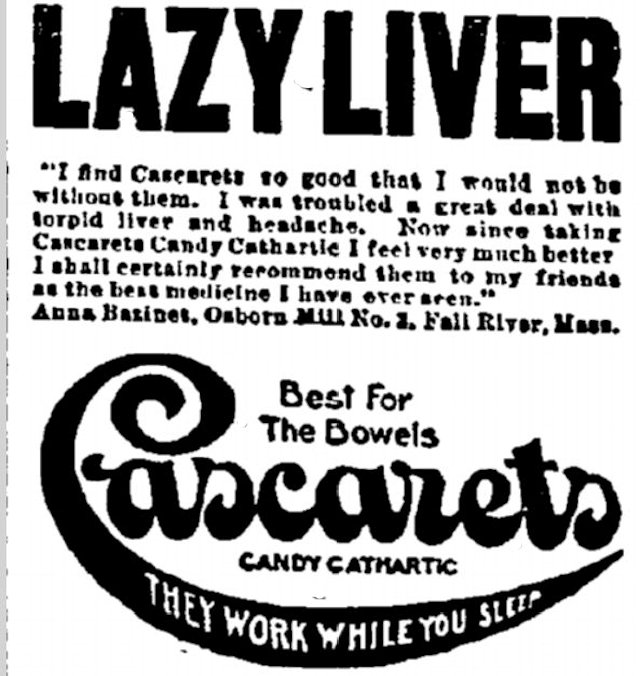 From 1916. Folks, do you have a lazy liver? Do you have trouble getting your liver to do even a single sit-up or squat-thrust? Does it refuse to take out the trash, mow the lawn, or whitewash that picket fence? Is your liver a bad influence on your other organs, encouraging them just lie around your thorax and watch Oprah? Then you need Cascarets, the candy cathartic.
From 1916. Folks, do you have a lazy liver? Do you have trouble getting your liver to do even a single sit-up or squat-thrust? Does it refuse to take out the trash, mow the lawn, or whitewash that picket fence? Is your liver a bad influence on your other organs, encouraging them just lie around your thorax and watch Oprah? Then you need Cascarets, the candy cathartic.
From 1916. There really were snake oil patent medicines. Good for the grippe (flu), croup (respiratory condition), neuralgia (nerve pain), lumbago (low back pain), the ad says. This brand contained serum harvested from snakes raised on a 750-acre farm in Brazil.
Yes, these ads of long ago tell us something about the people who wrote them, the people who read them, and the time in which they lived. I, for one, say thanks every night that those days of shameless misrepresentation in advertising are behind us.
But then the next morning I look at the spam in my inbox.
More on patent medicines:
The Weaker Sex? “Ladies, Here’s to Your Health (Hic)”
Shock Jock: “Just Let the Electrodes Work Their Magic”
Once Upon a Malady (Part 1): Of Cod and Continence
Once Upon a Malady (Part 2): Of Mandrake and Maltobeef
Near Beer, a Steer, and “Better Take Something for That Cough, Dear”
